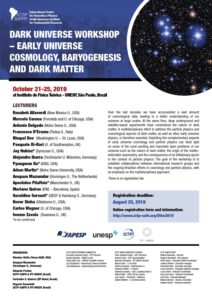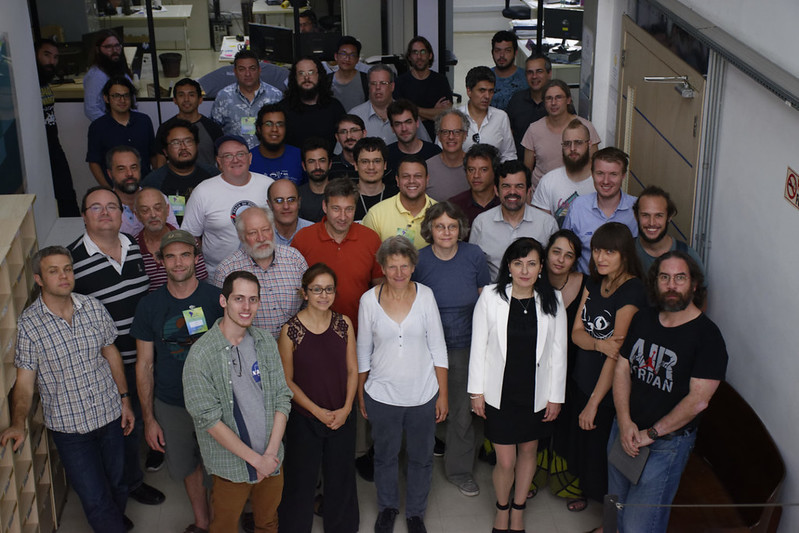Dark Universe Workshop – Early Universe Cosmology, Baryogenesis and Dark Matter
October 21-25, 2019
ICTP-SAIFR, São Paulo, Brazil
Auditorium of IFT-UNESP
Home
Over the last decades we have accumulated a vast amount of cosmological data, leading to a better understanding of our universe at large scales. At the same time, deep underground and satellite-based experiments have constrained the nature of dark matter. A multidisciplinary effort to address the particle physics and cosmological aspects of dark matter, as well as other early universe physics, is therefore essential. Exploiting the complementary aspects of early universe cosmology and particle physics can shed light on some of the most exciting and important open problems of our universe such as the nature of dark matter, the origin of the matter-antimatter asymmetry, and the consequences of an inflationary epoch in the context of particle physics. The goal of the workshop is to establish collaborations between international research groups and the ongoing Brazilian efforts in cosmology and particle physics, with an emphasis on the multidisciplinary approach.
There is no registration fee.
Organizers:
- Bhaskar Dutta (Texas A&M, USA)
- Anupam Mazumdar (Groningen University, The Netherlands)
- Eduardo Ponton (ICTP-SAIFR & IFT-UNESP, Brazil)
- Rogerio Rosenfeld (ICTP-SAIFR & IFT-UNESP, Brazil)
- Farinaldo S. Queiroz (IIP-Natal, Brazil)
Talks & Posters
Invited Speakers:
- Rouzbeh Allaverdi (New Mexico University, USA): Nonthermal Dark Matter and Baryogenesis
- Yang Bai (University of Wisconsin-Madison, USA): Primordial Extremal Black Holes as Dark Matter
- Ronaldo Batista (UFRN, Brazil): Describing Warm Dark Matter with the Reduced Relativistic Gas
- Geneviève Bélanger (Laboratoire de Physique Théorique – Annecy, France): Feebly interacting dark matter
- Antonio Delgado (Notre Dame University, USA): Higgsino DM from natural susy
- Pasquale Di-Bari (University of Southampton, UK): A unified model of neutrino masses, dark matter and leptogenesis testable at Neutrino Telescopes
- Francesco D’Eramo (Padua University, Italy): Displaced new physics at colliders and the pre-BBN universe
- Sylvain Fichet (ICTP-SAIFR/IFT-UNESP, Brazil & Caltech, USA): The warped dark sector
- Jay Hubisz (Syracuse U., USA): Cosmology of Brane Worlds From Symmetry Principles
- Alejandro Ibarra (Technische Universität München, Germany): Review on Dark Matter (IFT-Colloquium) /Astrophysical Uncertainties on Local Dark Matter Searches
- Markus Luty (University of California – Davis, USA): Blowing in the Dark Matter Wind
- Adam Martin (Notre Dame University, USA): Custodial Dark Pions
- Mariano Quiros (IFAE – Barcelona, Spain): Electroweak Baryogenesis and Dark CP violation
- Diego Restrepo (University of Antioquia, Colombia): Simplest Dirac scotogenic model
- Tania Robens (Ruđer Bošković Institute, Zagreb-Croatia): Constraining the Inert Doublet Model at current and future colliders
- Riccardo Sturani (II-P/UFRN, Brazil): Gravitational wave astronomy
- Thiago Tomei (NCC-UNESP, Brazil): Dark Matter Searches in CMS
- Carlos Wagner (Argonne Lab. & University of Chicago, USA): Higgs and Dark Matter physics in low energy Supersymmetry
- Ivonne Zavala (Swansea University, UK): Dark Energy and String theory
- Alfonso Zerwekh (Universidad Técnica Federico Santa María, Chile): Dark Matter and Vector fields in non-trivial representations of SU(2)_L
Short talks:
- Otávio Alonso Freire Alves (IFT-UNESP, Brazil): Probing Dark Matter properties using photometric surveys
- Marcos Cardoso (UFRRJ, Brazil): NMSSM and Dark Matter
- Vesselin Gueorguiev (Ronin Institute for Independent Scholarship, USA): The Scale Invariant Vacuum Theory as viable Cosmology Model
- Nathan Herring (University of Pittsburgh): Particle Decay in the Expanding Spacetime of Post-Inflationary Cosmology
- Téssio Rogério Nóbrega Borja de Melo (UFPB, Brazil): Dark Matter and Neutrino Masses in a 2HDM-U(1) model
- Dorota Sokolowska (II-P/UFRN): Anomalous ZZZ coupling as a sign of dark CP violation in the Three-Higgs Doublet Model
Posters:
- Tulio Caviquioli Cardoso (UFABC, Brazil): Search for Dark Matter Production at the CMS Experiment through the Mono-Photon Signature
- Elaine Fortes (Universidade Federal do Pampa, Brazil): Extragalactic background generated by the annihilation / decay of dark matter.
- Karin Silvia Franzoni Fornazier Guimarães (Instituto Nacional de Pesquisas Espaciais BINGO, Brasil): Forecasting for non-gaussian features in 21cm intensity mapping
- Marcio de Sousa Mateus Junior (IF/UFRGS, Brazil): A investigation of the dark photon as mediator between dark matter and the standard model
- Rogério Monteiro de Oliveira (USP, Brazil): Unveiling the dark side of the Universe through merging galaxy clusters
- Eduardo Akio Sato (UNICAMP, Brazil): Self-energy correction to scalar triplet leptogenesis in the HTL scheme
- Ana Maria de Sousa Slivar (UFABC, Brazil): Study of Mono-Z Production at the LHC as Evidence of Dark Matter
- Ion Vasile Vancea (UFRRJ, Brazil): Simplified Models of Dark Matter with graviton mediators in de Sitter
Poster
Program
Workshop program: PDF updated on October 17, 2019
Videos & Files
- 10:00 - Jay Hubisz (Syracuse U., USA): Cosmology of Brane Worlds From Symmetry Principles
- 10:10 - Ivonne Zavala (Swansea University, UK): Dark Energy and String theory
- 10:50 - Ronaldo Carlotto Batista (UFRN, Brazil): Describing Warm Dark Matter with the Reduced Relativistic Gas
- 15:00 - Vesselin Gueorguiev (Ronin Institute for Independent Scholarship, USA): The Scale Invariant Vacuum Theory as viable Cosmology Model
- 10:00 - Mariano Quiros (IFAE – Barcelona, Spain): Electroweak Baryogenesis and Dark CP violation
- 11:10 - Rouzbeh Allaverdi (New Mexico University, USA): Nonthermal Dark Matter and Baryogenesis
- 11:50 - Pasquale Di-Bari (University of Southampton, UK): A unified model of neutrino masses, dark matter and leptogenesis testable at Neutrino Telescopes
- 14:00 - Nathan Herring (University of Pittsburgh): Particle Decay in the Expanding Spacetime of Post-Inflationary Cosmology
-
14:45 - Otávio Alonso Freire Alves (IFT-UNESP, Brazil):
Probing Dark Matter properties using photometric surveys
- 15:00 - Téssio Rogério Nóbrega Borja de Melo (UFPB, Brazil): Dark Matter and Neutrino Masses in a 2HDM-U(1) model
- 15:15 - Marcos Cardoso Rodriguez (FRRJ, Brazil): NMSSM and Dark Matter
- 15:30 - Dorota Sokolowska (II-P/UFRN): Anomalous ZZZ coupling as a sign of dark CP violation in the Three-Higgs Doublet Model
- 10:00 - Thiago Tomei (NCC-UNESP, Brazil): Dark Matter Searches in CMS
- 11:10 - Francesco D’Eramo (Padua University, Italy): Displaced new physics at colliders and the pre-BBN universe
- 11:50 - Geneviève Bélanger (Laboratoire de Physique Théorique – Annecy, France): Feebly interacting dark matter
- 14:00 - Alejandro Ibarra (Techinische Universität München): The quest for particle dark matter
- 15:30 - Carlos Wagner (Argonne Lab. & University of Chicago, USA): Higgs and Dark Matter physics in low energy Supersymmetry
- 10:00 - Alfonso Zerwekh (Universidad Técnica Federico Santa María, Chile): Dark Matter and Vector fields in non-trivial representations of SU(2)_L
- 11:10 - Diego Restrepo (University of Antioquia, Colombia): Simplest Dirac scotogenic model
- 11:50 - Tania Robens (Ruđer Bošković Institute, Zagreb-Croatia): Constraining the Inert Doublet Model at current and future colliders
- 15:00 - Alejandro Ibarra (Technische Universität München, Germany): Astrophysical Uncertainties on Local Dark Matter Searches
- 10:00 - Antonio Delgado (Notre Dame University, USA): Higgsino DM from natural susy
- 11:10 - Adam Martin (Notre Dame University, USA): Custodial Dark Pions
- 11:50 - Sylvain Fichet (ICTP-SAIFR/IFT-UNESP, Brazil & Caltech, USA): The warped dark sector
- 15:00 - Riccardo Sturani (II-P/UFRN, Brazil): Gravitational wave astronomy
-
15:40 - Yang Bai (University of Wisconsin-Madison, USA):
Primordial Extremal Black Holes as Dark Matter
- 16:50 - Markus Luty (University of California – Davis, USA): Almost Inert Higgs Bosons at the LHC
asdasdasd
Photos
Additional Information
Registration: ALL participants should register. The registration will be on October 21 (Monday) at the institute at 09:00 am.
List of Participants: Updated on October 15, 2019
Poster presentation: Participants who are presenting a poster MUST BRING A BANNER PRINTED. The banner size should be at most 1,5m x 1m. We do not accept A4 or A3 paper. Click here to see what a banner looks like: http://designplast.ind.br/produtos/detalhe/impressao-digital/banner/119/9
Visa information: Nationals from several countries in Latin America and Europe, Australia, Canada, Japan and USA are exempt from tourist visa. Please check here which nationals need a tourist visa to enter Brazil. Please check here which nationals need a tourist visa to enter Brazil.
Hotel recommendation: http://www.ictp-saifr.org/hotel-recommendations-2. Participants and Speakers whose accommodation will be provided by the institute will stay at The Universe Flat.
How to reach the Institute: The workshop will be held at ICTP South American Institute, located at IFT-UNESP, which is across the street from a major bus and subway terminal (Terminal Barra Funda). The address which is closer to the entrance of the IFT-UNESP building is R. Jornalista Aloysio Biondi, 120 – Barra Funda, São Paulo. The easiest way to reach us is by subway or bus, please find instructions here.
Yellow fever vaccination is recommended for travellers going to Brazil. Note that the vaccine needs to be taken at least ten days before the trip to be effective. Information: https://wwwnc.cdc.gov/travel/notices/alert/yellow-fever-brazil


